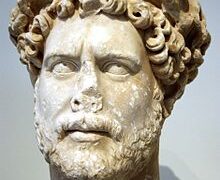One of the books I got recently is James Gilligan’s Why Some Politicians are more Dangerous than Others. He’s a psychiatrist and was trying to work out why there are periodic spikes and dips in lethal violence in The United States. He was able to use data to demonstrate that there’s a direct correlation between Republican presidents and rises in lethal violence and falls during the tenures of Democratic presidents. He tells us on page 3 that “When [he] subjected these yearly changes to statistical analysis, [he] found that in all three cases – for suicide, for homicide, and for total lethal violence (meaning suicide and homicide rates combined) – the association between political party and lethal violence rates was statistically significant.” What’s more, the data shows that murders and suicides rise and fall together which is remarkable because, as Gilligan rightly says, we don’t see suicides (the people that is) as being very similar to murderers. Suicidal people “are generally considered to be either sad or mad; they are patients usually seen in a psychiatric office or hospital. People who commit homicide are usually seen as criminals and considered to be bad. They are commonly regarded as needing not treatment but punishment, and they are found, for the most part, in prison, not mental hospitals or private offices.” On the subject of motivation for murder and suicide, Gilligan argues that “shame [is] the proximal cause of violence, the necessary – although not sufficient – motive for violent behaviour.” He wonders whether “unemployment, relative poverty, and the sudden loss of social and economic status have been observed to increase the intensity of the emotion of shame.” Orwell on Nationalism Then I turn to George Orwell’s essay, Notes on Nationalism. He writes that this is...
Americans, Brains and Ezra the Scribe...
posted by Cloud
The Monroe Doctrine This was what would now likely be termed an isolationist policy adopted by the Americans which stated that the Europeans had no business interfering in any way on the continents of the Americas – that is, Central and South America. The Americans supported independence movements in Chile, Argentina, Colombia and Mexico. They were the first to recognise Brazilian independence in May, 1824. The British approached the Americans in 1823 to make a joint declaration to the effect that ex-Spanish colonies in the Americas were irrecoverable to Spain. In the end, the Americans decided not to make a joint statement but a separate one stating, in a word, “Hands off the Americas, Europe!” (Source: The Treasury of the Encyclopædia Britannica, Viking Penguin, 1992 Brain Surgery Henry Marsh, in his book, “Do no Harm: Stories of Life, Death and Brain Surgery,” admits to causing harm to a patient in an attempt to help her. His efforts to remove a tumour from her brain resulted in paralysis. He writes that “[He] had been insufficiently fearful.” He wouldn’t feel at peace again until the next successful operation had been completed. (Source: Marsh, Henry, Do no Harm: Stories of Life, Death and Brain Surgery, Wiedenfeld & Nicolson, 2014 Ezra, the Scribe After the Judeans were banished sometime around the 6th century B.C.E. they were allowed to settle in Nippur, near Babyon. One of their tribe was Ezra, a scribe. He and some followers were tasked with going to Jerusalem by Artaxerxes, king of Persia. They had his protection but his interest wasn’t altruistic: he wanted them to establish an imperial outpost. Ezra was horrified by what he found in Judea: it was nearly deserted, and those who did live there were ignorant farmers who’d shed their...
Polyarchy, foxes, wolves and other stuff....
posted by Cloud
Noam Chomsky In Doctrines and Visions, Chomsky alludes to notion that there are, at any one time, only a minority of men capable of ruling since most men are beasts. Since the Revolution in England in the seventeenth century, democracy hasn’t been about the multitude of “beasts in men’s shapes” but rather the concentration of power in the hands of the few. These “men of best quality” serve to ensure that “a system of elite decision-making and public ratification” is enshrined: “polyarchy” is the term. How is the multitude to be put in its place. One way is to manufacture consent, that “public ratification.” People must believe in and willingly adhere to what their leaders are telling them. Walter Lippman wrote that a “specialized class” of leaders must be empowered so as to direct the public who, without these leaders wouldn’t manage their own affairs. THe public, according to Lippman are ignorant and meddlesome; leaders of men are trained “in the law schools and law offices and in business” so as to “live free of the trampling and the roar of a bewildered herd…ignorant and meddlesome outsiders.” Niccolo Machiavelli’s The Prince This famous and supposedly precocious political thinker Machiavelli, whose name is nowadays an adjective meaning anything from “devious” to “self-serving,” wrote The Prince as a CV for a job in the administration of Lorenzo De’ Medici of Florence. In it, he says more or less that he has an understanding that men generally do not have and that, while he has access to knowledge and insight that may be unsavoury, it is no less essential for it. Machiavelli advises Lorenzo that “there are two ways of fighting: by law or by force.” The first is preferable but sometimes ineffective. Leaders must derogate to...
The Intimate Sense of Smell...
posted by Cloud
The Intimate Sense of Smell “The Intimate Sense of Smell” in Nat Geo by Boyd Gibbons (Sept. 1986) features the word “mesquite.” In reference to Baudelaire the article uses the word “censer.” ( The former is a kind of tree; the latter is synonymous with “thurible.”) “What we lack is not a profound sense of smell, but encouragement to talk about intimate odors.” Neither do we practice an adequate vocabulary when it comes to smell. Germans say “Ich kann ihn nicht riechen.” This means “I can’t smell him,” which really means “I can’t stand him.” Knights In Lawrence James’ “Warrior Race” about the British at war, knights are depicted as physically powerful, highly trained and spiritually intact servants of their king. There’s a “but;” the demands of chivalry were such that over time acquisitiveness became a greater influence. A knight was entitled to the spoils of war. He was, after all, risking life and limb for victory; why shouldn’t he profit? Kings such as Richard III and Henry VIII actively encouraged rapacious, vengeful behaviour in their knights, ensuring that a message was sent – namely that challenging his power entailed consequences. Not that Big Brother Lionel Shriver’s “Big Brother” tells the story of Pandora Halfdanarson whose brother Edison was once a successful jazz pianist and is due to stay with her for a while. She collects him at the airport only to discover he is morbidly obese. She acts like she doesn’t notice but before long tensions arise at home, not least because her fitness-obsessed husband Fletcher can’t abide her sibling; neither does the latter try especially hard to get along with his brother-in-law. Edison agrees to lose weight with Pandora’s help but this help may come at the cost of her marriage since...
The Good Book
posted by Cloud
The Good Book Bible references are everywhere, giving the lie to the popular notion (especially amongst our younger readers) that the Good Book is irrelevant. Bruce Springsteen’s song Adam Raised a Cain makes references to the first man and his son Cain, the first murderer; Dostoyevsky mentions Elias from the book of Luke Chapter 1, verse 17 in his The Brothers Karamazov: ‘and he will go before him in the spirit and power of Elijah/ to turn the hearts of the fathers to the children/ and the disobedient to the wisdom of the just/ to make ready for the Lord a people prepared.” Who’s Luke anyway? I hear you ask. He is, according to Bible scholar David Pawson, “the best loved but the least well known of all the four Gospels.” The book of Luke contains the stories of the Good Samaritan and the Prodigal Son (The Rollings Stones have a song called Prodigal Son). And while other books such as Matthew talk about the Disciples being likened to salt, Luke elaborates on the metaphor. Luke also contains the only story about Jesus’ first 30 years. Steven Pinker, renowned Harvard academic and author writes in The Better Angels of our Nature (reviewed elsewhere on this website) that the Old Testament is proof that the world has got less violent. The book Sex and Punishment by Eric Berkowitz mentions the book of Leviticus and how in it the Jews outline their laws including their ban on homosexuality because it doesn’t promote the production of more Hebrews. Leviticus is also where you’ll find Sodom and Gomorrah (Gomorrah is a movie too, while The Pogues have an album called Rum, Sodomy and the Lash). Iron Maiden have a song called Revelations inspired by the Book of Revelation,...
Jeezny Horrorshow
posted by Cloud
Betraying your mother Zhang Hongbing, along with his father, denounced his mother during the Cultural Revolution in China. Some of Mao’s enforcers are now in their seventies and wish to atone for their sins. Chillingly, Zhang says denouncing a parent was de rigeur in China for a time: “The whole country was doing it.” His mother tore down Mao posters and her arrest meant certain death, Zhang admits. He’d begun to see her as a monster. (The Guardian, Thursday, March 28th) The Cyprus Scandal Fintan O’Toole alluded to Renton in Trainspotting complaining that the Scottish couldn’t even find a decent country to be colonised by. He compares the Cyprus scandal to our Wizard of Oz moment, where our supposed rulers are exposed as fools. Then he likens it to the story of The Three Little Pigs, with the Southern and Western European pigs and their flimsy homes and the Northern European pigs with their sturdy equivalent. The Euro, he reminds us, was a German idea. German banks’ greed fed the myth that the Germans are industrious and wise while the Greeks are lazy. German banks are under investigation while our role is to take our medicine with gratitude. But people power in Cyprus prevented more stupidity. All unaccountable institutions, such as the Troika, are dangerous; the Troika is undemocratic. (Fintan O’Toole, The Irish Times, March 26th 2013) Amanda Knox The Supreme Court’s role is to analyse what the Appeal Court does. However, in the case of the recent Amanda Knox ruling, the Supreme Court appears to have gone right back to the original trial’s evidence and ordered a retrial on that basis, thereby leap-frogging the Appeal Court. The original ruling came in December 2009 when Amanda Knox and her then boyfriend Rafaelle Sollecito were...
Jeezny Horrorshow
posted by Cloud
Lexicography Lexicography is all about words and their meanings but more importantly knowing how and when to use them. The best words are the insightfully chosen ones. Take this quote from William F. Buckley Jnr: “We face a concrete problem in Europe given the tergiversation of Helmut Kohl on the modernising of the remaining nuclear missiles in West Germany.” This demonstrates that the word “tergiversation” meaning “the reversal of one’s opinion; backsliding” is a real one first of all and can apply to real-life situations. When are you ever really going to need the word “arachibutyrophobia”? One I like, which was vaguely familiar to me, is “callow”, an adjective, defined as “Lacking in adult sophistication, experience, perception or judgment.” Buckley Jnr., William F. The Lexicon: A cornucopia of wonderful words for the inquisitive word lover, Harcourt, 1996. Remembering stuff Remembering things like the order of the cards in a shuffled pack isn’t necessarily considered a required skill by most. But “mental athletes” compete to see who can retain the most information. Besides, remembering things is useful, very useful. For example, waiters and barmen need to remember long lists of orders; students may need to commit whole poems to memory; keeping friends can sometimes be a memory game, as anyone who’s ever forgotten their lover’s birthday will probably know. Skilled memory theory argues that continual, habitual practice can improve memory: K. Anders Ericsson argued that exceptionally talented “memorizers” are made, not born. Michel Siffre lived “beyond time” in a cave, without any of the usual items or routines were rely on and found his memory deteriorated. Eventually he couldn’t remember what happened the day before. Foer, Joshua, Moonwalking with Einstein: The Art and Science of Remembering Everything, Penguin 2011 Primitive man was more talented was...
Jeezny Horrorshow
posted by Cloud
Guerrilla “Guerrilla,”from the Spanish meaning “little war” comes from the time the Romans were attempting to conquer Spain. It allowed “bandoleros” or smugglers and bandits to legitimise their activities. But these original Spanish guerrillas, from their advent to at least the time of Wellington, needed to work in tandem with a regular army. For instance, Spanish guerrillas worked in a symbiotic relationship with Wellington’s British forces against France. The downside of guerrilla warfare is that the distinction between combatant and non-combatant becomes blurred. This is attested to by the Prussian Prince Frederick Charles who said, “There is for a commander nothing more oppressive than a situation which is not clear”. The Prussians, according to Bismarck, didn’t treat these French guerrillas as combatants but as murderers. Mao and Orwell It’s uncanny how prophetic Orwell’s Nineteen-Eighty-Four was, especially considering Orwell died in 1950. Take this account by Jung Chang of what Mao Tse-Tung hoped to achieve and bear in mind it relates to the late 1950s: “What Mao had in mind was a completely arid society, devoid of civilisation, deprived of representation of human feelings, inhabited by a herd with no sensibility, which would automatically obey his orders.” And not only that: Mao used the supposedly veracious diaries of a dead soldier called Lei Fend to try to exhalt the quality of being mindlessly enthralled by a will to obey Mao: “This cult of personality, the necessary obverse of the cult of Mao’s personality, was cloaked in a deceptive appeal to be selfless – for “our” country, or “the people”. Land and Freedom Land and Freedom is a movie by Ken Loach in which Ian Hart plays a Liverpudlian called David who, upon attending a lecture, is inspired to go to Spain and fight for the...
Jeezny Horrorshow
posted by admin
Legal matters Actus reus is loosely defined as the physical act of a crime including its consequences. A simple example would be the act of hitting another in the face and the results of said action such as blood flowing from the nose. The actus reus can further be divided into “result” offences and “conduct” offences. The former, to be proved, require a demonstration of the results of an act, say a dead body as a result of a gunshot wound; the latter requires proof only of the conduct rather than the immediate result. Perjury for instance needs no demonstration of a result since the act of perjury alone is proof of the crime. (From Irish Criminal Law by Conor Hanly) Seeds and eggs Insect eggs come in all shapes and sizes. They are as varied as the insects they promise to become and the places they are deposited. The egg of the Julia helioconian butterfly is generally spherical, almost. However, its outer surface is comprised of concave patches vaguely squarish in shape, all of them separated by white spines. (National Geographic, September 2010) Il Duce Mussolini’s office in the Mappa Mundi was so big that visitors were required to run to reach his desk. He was involved in the murder of Giacomo Matteotti in 1924. He was said to have had “extravagant longings” and portrayed himself as a kind of infallible genius with a streak of the devine, capable of performing miracles such as saving towns from volcanoes . Cancer Siddhartha Mukherjee, an oncologist and award-winning author, argues that cancer is such a concern today because it wasn’t taken seriously enough in the past. The National Cancer Institute was set up in America in 1937 but the war with Nazism and the Japanese...









